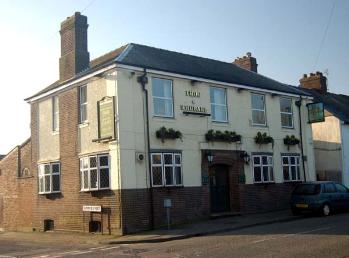The Frog and Rhubarb Public House Slip End

The former Royal Exchange in March 2007
The Frog and Rhubarb Public House [formerly The Royal Exchange]: the corner of Church Road and Summer Street
There are few references to this public house in records held by Bedfordshire & Luton Archives & Records Service because the premises were owned by an out-county brewery - Northampton Brewery. However, it is noted in directories, licensing registers and valuations there are valuations from 1917 and 1927.
The countywide licensing register of 1876 notes that the Royal Exchange, as the Frog and Rhubarb was then called, was owned by Thomas Gatward of Caddington. It was already a fully licensed public house and no date for the grant of the initial licence is given. The pub is first mentioned in a licensing register beginning in 1872 [PSL6/1]. Thomas Gatward is still listed as the owner in ther countywide licensing register of 1891 but by the time of the 1903 register the owner is the Northampton Brewery Company. The establishment is described as out of repair and not clean, sanitationbeing unsatisfactory. The nearest licensed premises was 110 yards away. The Royal Exchange had a front door and a side entrance.
The valuation of 1917 was for renewal of the licence. It was carried out by Arthur Walker Merry of Stafford, Rogers & A. W. Merry of Leighton Buzzard and Bedford. He found that the house was brick and slate and the structure was "in fair order only". Public accommodation comprised a bar with a small counter, a tap room with no counter, a small parlour and a public entrance and a separate entrance for bottle and jug (i.e. off-licence) trade, there was also a club room with access through the private apartments. Other features were a private room, a wash house and four bedrooms. Outside was a yard with stabling, shedding a public urinal and wc - "three houses at side have access to yard to get water". Overall the valuer considered "Not in a good state of decorative repair. Supervision inadequate. Ventilation poor. ceiling low. There is no accommodation for travellers nor is food regularly supplied". He considered that with only 122 houses in Slip End the village could do without either the Royal Exchange or the Rising Sun which he also inspected and found to be "in every way adapted for the carrying on of the licensed trade".
The Luton News of 15th March 1917 reported the proceedings with regard to the Royal Exchange thus, making it clear that it had been the intention to refuse renewal of the notice: "The Royal Exchange, Slip End, was the next case, the licensee being Geo. Wilson. Mr. B. Campion, barrister of London, represented the Northampton Brewery Co., and at the outset contended on a technical point, that proper notice of objection [to renewal of the licence] had not been served, and the Clerk (Mr. A. F. Barnard), after reading the notice, agreed that Mr. Campion was right. Mr. Campion said the notice delivered was ineffective, and that the Bench were therefore not entitled to refer the house. This would give them another year to look round, and circumstances might alter by then. As matters stood they needed to fend off trouble if they could. The Clerk said it was open to the Bench to adjourn the case, and amend the notice, but Mr. Campion held that could only be done if no notice at all had been served. The Chairman: We agree that proper notice has not been served, and it will stand until next year. Mr. Campion explained that he only made this contention in view of the abnormal conditions of the day. The application for the renewal of the license was therefore granted".
In the event the Royal Exchange survived and ten years later, in 1927, a valuation was carried out under the 1925 Rating Valuation Act [DV1/C24/61]. The valuer found a substantial, detached property with a bar, smoke room ("both good"), bottle and jug room, reception room and scullery downstairs, with a cellar below, and four bedrooms and a bathroom above. Outside were a shed for storing lumber, a public urinal, public wc, coal barn and earth closet along with a coachhouse "in poor condition". Trade was "not so good as it was" comprising 2½ barrels of beer per week, 14 dozen bottles of beer and stout and four dozen bottles of minerals - gross takings were £1,200 per annum.
The public house remains open but has been renamed the Frog & Rhubarb.
References:
- PSL6/1: Register of Alehouse Licences - Luton Petty Sessional Division: 1872-1901;
- BML10/45/10: Luton Licensing Sessions: 1917;
- DV1/C24: valuation survey: 1927;
- PSL6/2: Register of Alehouse Licences - Luton Petty Sessional Division but without Luton Borough premises: 1929-1954
List of Licensees: note that this is not a complete list. Italics indicate licensees whose beginning and/or end dates are not known:
1872: Hezekiah Hone;
1904: Ernest Amos;
1905: Herbert Charles Taylor;
1914: George Wilson;
1936: William James Jeyes;
1941: Ernest Christopher Mumford;
1944: Francis James Frederick Fanest;
1952: Thomas Boones;
1952: Frederick Samuel Addy;
1961: Elizabeth Grace Addy;
1985: Harry Goldman;
1986: John Christopher Hutt;
1987: John Hutt and D. Barnes;
1988: C. W. Rees and P. D. Barton;
1988: Ian John Turnbull and Christopher William Rees;
1988: Stephen Richard Pennington;
1992: Ian Dawson Jones and Steven Pennington;
1993: Ian Dawson Jones and Declan Francis O’Connor